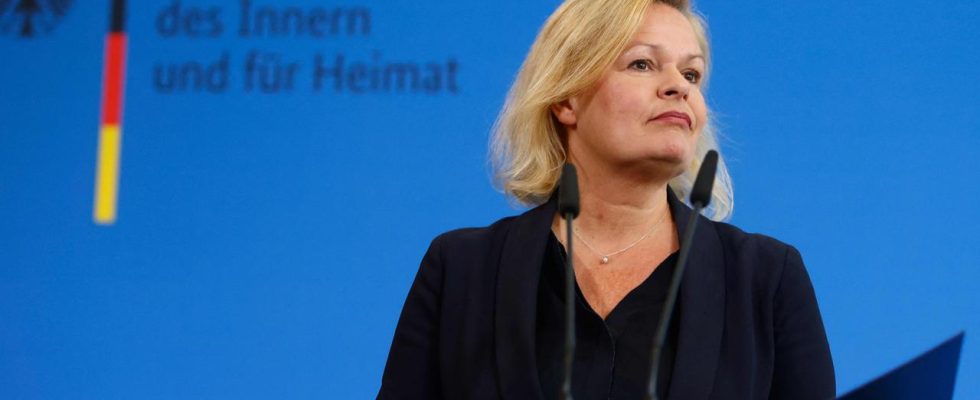analysis
The federal government has agreed on stricter deportation rules. It is a sign that the traffic light is taking action in migration policy. But deportations are only one of many adjustment screws.
More pressure on foreigners who are obliged to leave the country, harsher consequences for smugglers and at the same time more rights for the police and other authorities: Federal Interior Minister Nancy Faeser (SPD) speaks of a “bundle of restrictive measures” in her draft law in order to “significantly limit” irregular migration to Germany.
What sounds like new determination is actually just the implementation of the coalition agreement. The SPD, Greens and FDP had already announced at the beginning of their government at the end of 2021: “We are launching a repatriation offensive in order to implement departures more consistently.”
The logic behind it, then as now: Irregular migration should be limited in order to be able to help refugees from war and terror. Only if the population has the impression that the government has control of migration under control will people be open to the necessary immigration into the labor market. The federal government itself repeatedly speaks of a “pragmatic compass of humanity and order”.
Pressure from municipalities and states
When it comes to the last aspect in particular, the pressure on the federal government to act has increased enormously in recent months: many municipalities see themselves at the limit – given the significant increase in the number of asylum seekers this year. According to pollsters, the declines in traffic light parties and the AfD’s successes in state elections are also due to dissatisfaction with migration policy. And CDU leader Friedrich Merz attacks the federal government from the opposition on the immigration issue.
Federal Chancellor Olaf Scholz set a sharper tone in migration policy in the “Spiegel” interview. Foreigners without the right to remain must be deported “finally” and “on a large scale”. A choice of words with which the Chancellor wanted to make it clear: Things are getting serious.
Only a slight increase
With its rhetoric and the planned new deportation regulations, the federal government is now demonstrating its ability to act, but it is probably raising expectations that are too high. “In the end, little will change,” says political scientist Stefan Luft in an interview tagesschau24.
Interior Minister Faeser speaks of a “large number of cases” in which deportations would now be easier. But the draft law states that it is “difficult to estimate” how many additional deportations there will be as a result of the new regulation. It is assumed that the number of deportations will only increase by around 600 per year. That would only be a small increase – with around 12,000 deportations in each of 2021 and 2022.
It depends on the Countries of origin at
In any case, the new regulations only directly affect some of the people who are obliged to leave the country: at the end of September, according to the Federal Ministry of the Interior, 255,000 foreigners who are obliged to leave the country were living in Germany. However, around 205,000 of them had a toleration permit; they cannot be deported for certain reasons – for example because they have no identification documents or are sick or are at risk of life and limb in their country of origin. Even if those required to leave the country undergo training, deportation is suspended.
In some cases it will now be easier for the police to find people who have to go into hiding and to take action against smugglers. Since 2015, however, several tightening of the law have not resulted in a noticeable increase in the number of deportations, as figures from the Integration Media Service show.
Because more powers for German authorities are of no use if the countries of origin do not want to take in the people. The federal government is working on repatriation and migration agreements, but the negotiations are dragging on. For countries like Syria and Afghanistan, where most asylum seekers come from, there is unlikely to be a solution in the foreseeable future.
The organization “Pro Asyl” therefore criticizes the new legislative package: the federal government is sacrificing the basic rights of those affected to a current right-wing populist discourse. Stricter deportation rules would hardly lead to significantly more people being deported, but they would lead to even more hardship and violations of fundamental rights.
Criticism of the proposed law also comes from the ranks of the government coalition, from the SPD and Green factions: SPD member of the Bundestag Sebastian Roloff warned in the “Tagesspiegel”: “Measures that are primarily intended to show government toughness, but do not concretely improve the situation, don’t help.” Instead, one must concentrate on relieving the burden on municipalities and faster asylum procedures. However, the draft does not go far enough for the CDU/CSU and the AfD.
With the new deportation rules, the federal government wants to send a signal that it is taking action in migration policy. But the issue of deportations is only one of many adjustment screws.

